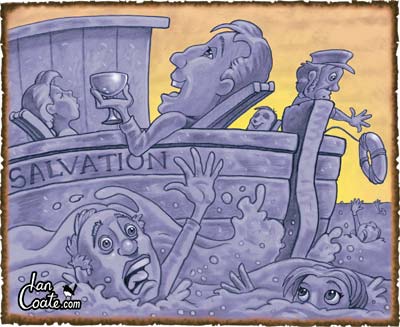![[www.freechristianillustrations.com][583]Title-Evangelism](https://www.bibleiq.org/wp-content/uploads/2020/01/www.freechristianillustrations.com583Title-Evangelism.gif)
S.O.S.
 A sinking cruise ship only had time to send a S.O.S. before it went down. Thousands of passengers floated in the water and clung to the hope of being rescued. Then, when all seemed lost, a charter boat sailed into view. Soon its skipper and crew were throwing down lifelines and hoisting people safely onto the deck. However, time was running out and there were still so many who needed to be saved.
A sinking cruise ship only had time to send a S.O.S. before it went down. Thousands of passengers floated in the water and clung to the hope of being rescued. Then, when all seemed lost, a charter boat sailed into view. Soon its skipper and crew were throwing down lifelines and hoisting people safely onto the deck. However, time was running out and there were still so many who needed to be saved.
The skipper turned around and called out to those who had been rescued to lend a hand, but few bothered. Most were too busy getting themselves comfortable on the deckchairs – now that they were saved they only wanted to continue their cruise.
When we believe in the Lord Jesus Christ and are rescued from eternal damnation, it’s natural to have a tremendous sense of relief. However, once saved, we have the option of making ourselves comfortable and continuing our cruise through life – or we can get off our deckchairs and lend a hand with the rescue mission of those still in deadly peril of eternal damnation.
These days, with mounting criticism against Christianity, it’s so much easier to hide our beliefs and cruise through life. But now we are saved, if our main concern is comfort and avoiding conflict, on reaching our Heavenly destination we won’t be punished for inaction, but we should keep in mind that we won’t be rewarded, either.
God has given us an amazing opportunity to be part of the biggest rescue mission in eternity. Maybe it’s time to get off our deckchairs and lend a hand, or more importantly ‘bend a knee’ in prayer for our missionaries, evangelists and teachers of the Word.
Then He said to His disciples, “The harvest truly is plentiful, but the labourers are few. Therefore pray the Lord of the harvest to send out labourers into His harvest.” Matthew 9:37-38
Bomb Threat Warning
 Arriving at work one morning a lady witnessed, what she believed, a terrorist sneaking into the building. As she fled, she passed her fellow workmates coming into the office and wondered if she should warn them. She hesitated and thought: What if they don’t believe me and nothing happens, how foolish I will feel. And if I am wrong and speak out, everyone will think I’m an idiot. As she quietly agonised on what to do, the office suddenly exploded into a great ball of fire.
Arriving at work one morning a lady witnessed, what she believed, a terrorist sneaking into the building. As she fled, she passed her fellow workmates coming into the office and wondered if she should warn them. She hesitated and thought: What if they don’t believe me and nothing happens, how foolish I will feel. And if I am wrong and speak out, everyone will think I’m an idiot. As she quietly agonised on what to do, the office suddenly exploded into a great ball of fire.
Later, the police took the lady’s statement. She told them everything she witnessed. When the police asked why she hadn’t warned her co-workers, she responded meekly, ‘I was too embarrassed – I didn’t think they’d believe me and think me a fool.’
The threat of judgement looms over all who haven’t accepted God’s gracious gift of salvation. He who believes in the Son (Jesus Christ) has everlasting life; and he who does not believe the Son shall not see life, but the wrath of God abides on him. John 3:36
If we as Christians believe there is a ‘Hell’ waiting for those who don’t accept God’s gift by believing in Christ, we should quickly warn our family and friends. If we are wrong – nothing happens. But if we are right – there will be a ‘Day of Judgement’. And as it is appointed for men to die once, but after this the judgement. Hebrews 9:27.
While we are alive, we have a golden opportunity to spread the ‘Good News of Salvation’ not only to our loved ones but to any who will listen. This is the commission God gives to all of us.
Alternatively, if we keep quiet about our beliefs for fear of embarrassment and peer pressure, how will we feel on Judgement Day if we witness friends being condemned to the Lake of Fire? If they see we are saved from eternal damnation (by believing in Christ), and yell at us: ‘Why didn’t you warn me – I too may have been saved?’ Won’t we would feel like cowardly friends if our only reply is, ‘Sorry, I was too embarrassed. I didn’t think you would believe me and label me a fool.’
For God so loved the world that He gave His only begotten Son, that whoever believes in Him should not perish but have everlasting life. (John 3:16).
Missionary of Circumstance
 A missionary is someone sent on a mission. A Christian missionary is understood to be a spiritually-gifted person sent to a foreign country to overcome language and cultural barriers in order to teach the Gospel.
A missionary is someone sent on a mission. A Christian missionary is understood to be a spiritually-gifted person sent to a foreign country to overcome language and cultural barriers in order to teach the Gospel.
We have a very narrow view of what is involved in being a missionary if we believe it is only to preach in foreign countries. Truth is God requires us all to be missionaries within our immediate surroundings. We are to witness to those who cross our path (by word or by action), whether at school, at home or at the office. No matter in what field, a Christian should be a beacon of professionalism, grace and virtue. When those in our periphery ask what makes us tick, we can reply in lingo they understand.
However, missionary work is even broader than this. Sometimes God requires us to go into foreign circumstances (adversity or prosperity) where our lives are dramatically changed. No-one complains about prosperity, but when suddenly hit with adversity we could initially curse God and ask, ‘Why have You afflicted me with this tragedy? Haven’t I tried to follow You with all my heart?’
In response, God may convey to us that many people are also suffering through similar tragedies and they, too, have been calling out in confusion and seeking answers. Because of this, God needed a strong Christian who understood their pain, who could give them answers, comfort and lead them to Christ and eternal life by example.
When our lives are suddenly and dramatically changed, it could be that God has specially chosen us for a very important mission. (1 Corinthians 1: 3-7. James 1:2-4)
Rescue Attempt
 Rescue attempts go wrong when trying to save someone who doesn’t want to be saved. You can throw people a life-line, but if they can’t see the danger or simply don’t want to be rescued, they will not grab the rope and may even get annoyed at your well-meaning attempt.
Rescue attempts go wrong when trying to save someone who doesn’t want to be saved. You can throw people a life-line, but if they can’t see the danger or simply don’t want to be rescued, they will not grab the rope and may even get annoyed at your well-meaning attempt.
As Christians, our commission is to go out and save souls. The problem today is many people don’t see a need for salvation. They either don’t believe in an afterlife or believe there will be no judgement hereafter. Evolution implies we have no soul and popular belief of spiritualism says everyone goes to Heaven.
When we attempt to rescue someone who doesn’t wish to be rescued, we invariably do more damage than good. Only people who realise they are in danger call for help. So what can we do to rescue loved ones who reject the Gospel and refuse Salvation?
Firstly, we should never give up on anyone – this is not our prerogative. Only God knows when a person has reached the point of no return.
Secondly, in trying to save anyone we should exhibit the patience and traits of Christ. He did not force Himself on anybody; it was His graceful attitude that guided many people to seek salvation.
Thirdly, and most importantly, we should pray that God brings an awareness of judgement (the eternal consequences of personal choice) into the lives of those who have rejected His gift of salvation. When they come to the realisation their immortal soul is in peril that is the golden opportunity to throw out the Divine-line (Gospel) and encourage them to grab hold.
For “whoever calls on the name of the Lord shall be saved.” Romans 10:13.
Fishermen
 What makes a good fisherman or fisherwoman? Good fishermen arrive at the right spot at the right time. They come prepared with the right equipment. They know something about the fish they’re after and choose the right-sized hook and bait to attract the fish. Most importantly, once a good fisherman casts the line, he or she patiently waits for the fish to nibble. If the fish likes the taste, it’s not long before it’s hooked.
What makes a good fisherman or fisherwoman? Good fishermen arrive at the right spot at the right time. They come prepared with the right equipment. They know something about the fish they’re after and choose the right-sized hook and bait to attract the fish. Most importantly, once a good fisherman casts the line, he or she patiently waits for the fish to nibble. If the fish likes the taste, it’s not long before it’s hooked.
As Christians, we should all aspire to be good Fishers-of-Men? Sadly, all too often, we ignore the rules of the good fisherman when evangelizing in the unsaved world. We choose a spot and a time that is convenient to us (usually when and where the fish are not biting). More often than not, we arrive unprepared and unequipped. We bring no bait (patience, compassion and tolerance). If we do happen to see a fish (someone interested in the Word), we zealously dive in, causing a frightful splash as we try to catch the fish with our bare hands. Tragically, the result is always the same. (Matthew 4:19)
In a War of Words
 In warfare today, we do not use the weapons of yesteryear. Swords, spears and bows are totally ineffective against machine guns, tanks, battle ships and aircraft. If we rush into battle armed with outdated weapons, we can expect to be quickly shot down.
In warfare today, we do not use the weapons of yesteryear. Swords, spears and bows are totally ineffective against machine guns, tanks, battle ships and aircraft. If we rush into battle armed with outdated weapons, we can expect to be quickly shot down.
Today, we are in the centre of a spiritual warfare and as Christian Soldiers our orders are very clear. ‘Go out and save souls’. To achieve this we need to communicate the Gospel. And to communicate we need words – and these are our weapons.
Satan is trying to make our weapons ineffective (an easy way to defeat an enemy is to disable its armaments). Many powerful spiritual words which were so effective and full of meaning in times past have been rendered useless today. Meanings change over time. In addition to this, the misuse from cults and religious nit-wits has damaged the good certain spiritual word can do.
So we should be careful selecting our weapons when presenting the ‘Great News’ of salvation to the unsaved world. This does not infer that we should ‘water down’ God’s word. Rather we should communicate in the language of today with concise words our peers understand. Otherwise our message will be quickly shot down. (Acts 22:1-2)
Teaching Under The Influence
 We all should know the dangers of driving while under the influence of alcohol. When someone who is not in a fit state to drive gets behind the wheel – lives inevitably are put at risk and often destroyed. The golden rule has been hammered home: ‘If you drink, don’t drive’.
We all should know the dangers of driving while under the influence of alcohol. When someone who is not in a fit state to drive gets behind the wheel – lives inevitably are put at risk and often destroyed. The golden rule has been hammered home: ‘If you drink, don’t drive’.
Just as there are times we should not drive, there are times we should refrain from teaching. We should be aware that teaching God’s Word while under the influence of discouragement, disillusionment and depression can have disastrous results. When feeling discouraged, the most encouraging thing we can do for our congregation, friends and children, is keep our mouth shut. (Proverbs 17:22)
To Each His Own
 God did not create only one plant, with one flower, with one fragrance. There are many different plants with unique flowers, each with its own colourings, characteristics and distinct fragrances. Some flowers attract bees, while others attract birds, butterflies, beetles, ants and even mice. A flower’s fragrance is designed to attract certain creatures to begin the process of pollination. Plants also flower in their own season. How well they flourish depends on whether they are firmly rooted in rich, watered soil and how much light they receive.
God did not create only one plant, with one flower, with one fragrance. There are many different plants with unique flowers, each with its own colourings, characteristics and distinct fragrances. Some flowers attract bees, while others attract birds, butterflies, beetles, ants and even mice. A flower’s fragrance is designed to attract certain creatures to begin the process of pollination. Plants also flower in their own season. How well they flourish depends on whether they are firmly rooted in rich, watered soil and how much light they receive.
Plants are rather like teachers of God’s Word. They have different appearances, colourings and personalities. Teachers who grow in God’s Word, feed off Christ’s light and speak the Truth without hypocrisy in their own personal style, will bloom in their own season. Their fragrance will resonate with a certain type of person who is attracted to the Truth presented in a way they understand. Just like the bee, these people will be pollinated (with the Gospel) and will spread it around when they go out into the world.
God did not create one flower to appeal to all creatures – nor did He create one teacher to appeal to all people. God has illustrated this in the Twelve Apostles. Each had their own distinct personality, characteristics, styles and uniquely different fragrances. (Jeremiah 3:15)
Quality over Qualification
 Just because a bird has wings doesn’t mean it’s going to fly.
Just because a bird has wings doesn’t mean it’s going to fly.
If we think God will use us simply because we have the right human qualifications (education, beauty, strength, skills), we may be in for a rude shock. God is not impressed by our human qualifications – He looks at the quality of the inner person.
Quite often qualified people rely on their credentials instead of relying on God. But when faced with a Goliath problem that is bigger than their human assets they collapse in a heap.
The Pharisees had all the worldly qualifications to do God’s will but sadly most failed to have the right inner qualities. Instead, God used the unqualified (shepherds, fishermen, tax collectors, prostitutes) who displayed the right qualities.
In the spiritual realm, we should not focus on our assets. As soon as we feel eminently qualified to do God’s will, it is usually the time we are disqualified. By our own efforts, we may have all the trappings of success and impressed many people, but we will never reach the heights God intended.
We learn in the Bible that God uses those who are faithful to His promises and totally dependent on His power. This does not imply that God doesn’t use those who are educated, beautiful, successful or powerful; we can see many Biblical examples that He does, but these candidates had the right abilities and the right attitude.
Hands down, God always favours quality over qualifications. Let us not forget that our Saviour, Jesus Christ, the King of Kings and Lord of Lords, was only humanly qualified to be a carpenter.
For the Lord does not see as man sees; for man looks at the outward appearance, but the Lord looks at the heart.1 Samuel 16:7b
Spectacular Testimony - Wise Testimony
 A man and his wife were on a journey when suddenly they came to a deep ravine, where a little bridge spanned the depths below to the other side. The man cried out: ‘I will not trust that bridge.’ So he began to climb down the ravine. As he descended he slipped and fell. Miraculously, however, he was not hurt. Then, as he was dusting himself off, he looked up to see a hungry lion charging towards him. Immediately, the man pulled out a dagger and wrestled with the beast, managing to escape its teeth and claws to slay the hungry animal. Picking himself up, the man went on to the raging river but, as soon as he dived in, the waters smashed him onto rocks and sent him down a waterfall. When he surfaced, he found he was surrounded by crocodiles, so he swam as fast as he could to the closest shore with crocodiles snapping at his heels. Somehow, the man escaped their jaws and he was able to drag himself ashore. But the problem was he was still on the wrong side of the ravine. He looked again at the waiting crocodiles and sighed, knowing he could never get past them. So, he climbed back up the ravine and walked nervously towards the bridge. Slowly and ever so carefully he crept onto the bridge, his knuckles white as he looked down at the ravine far below. Inch by inch he progressed until at last he made it to the other side. Kissing the ground and jumping with glee, he cried out to his wife: ‘I’ve made it! Who’d have thought this bridge was safe? Look Honey, I’m finally here safe and sound.’
A man and his wife were on a journey when suddenly they came to a deep ravine, where a little bridge spanned the depths below to the other side. The man cried out: ‘I will not trust that bridge.’ So he began to climb down the ravine. As he descended he slipped and fell. Miraculously, however, he was not hurt. Then, as he was dusting himself off, he looked up to see a hungry lion charging towards him. Immediately, the man pulled out a dagger and wrestled with the beast, managing to escape its teeth and claws to slay the hungry animal. Picking himself up, the man went on to the raging river but, as soon as he dived in, the waters smashed him onto rocks and sent him down a waterfall. When he surfaced, he found he was surrounded by crocodiles, so he swam as fast as he could to the closest shore with crocodiles snapping at his heels. Somehow, the man escaped their jaws and he was able to drag himself ashore. But the problem was he was still on the wrong side of the ravine. He looked again at the waiting crocodiles and sighed, knowing he could never get past them. So, he climbed back up the ravine and walked nervously towards the bridge. Slowly and ever so carefully he crept onto the bridge, his knuckles white as he looked down at the ravine far below. Inch by inch he progressed until at last he made it to the other side. Kissing the ground and jumping with glee, he cried out to his wife: ‘I’ve made it! Who’d have thought this bridge was safe? Look Honey, I’m finally here safe and sound.’
‘That’s nice darling,’ replied the man’s wife, who had been waiting patiently. ‘Shall we proceed?’
Sometimes, the most spectacular testimonies are a sign of great stubbornness. For some, God has to perform great miracles and take them to the very edge before they finally pay attention and listen to His voice. A wise testimony would be: ‘Life was going well – I heard the Gospel and I realized life could be much better – I needed no second invitation.’ (Psalms 32:9)
Missed Opportunity
 It is too late to close the gate once the horse has bolted – to put on a parachute after jumping – to strap on a seatbelt after the accident or to erect a pool fence after the baby has drowned. Regrettably, they are missed opportunities to have done the right thing at the right time.
It is too late to close the gate once the horse has bolted – to put on a parachute after jumping – to strap on a seatbelt after the accident or to erect a pool fence after the baby has drowned. Regrettably, they are missed opportunities to have done the right thing at the right time.
It is also too late to ‘give’ the Gospel to someone who is dead. During our lifetime we have a golden opportunity to relay the ‘Greatest News of All’ (John 3: 16) to loved ones and those in our periphery. However, this is not an eternal opportunity. Without warning, they or we could be gone. We should do everything we can to ensure we don’t ‘eternally’ regret missing the golden opportunities available to us NOW. (Colossians 4: 3-6)
Living in a Sick World
 Hospitals are filled with sick and dying patients suffering from all types of different ailments: cancer, heart problems, broken bones – the list is long. These conditions cannot all be treated with one quick universal ‘band aid’ solution – different ailments require specialist doctors for treatment.
Hospitals are filled with sick and dying patients suffering from all types of different ailments: cancer, heart problems, broken bones – the list is long. These conditions cannot all be treated with one quick universal ‘band aid’ solution – different ailments require specialist doctors for treatment.
We live in a sick and dying world where every nation is a patient. However, not every nation suffers from the same illness. Some are afflicted with poverty, some with tyranny, while others suffer from war and famine. Ironically, prosperous countries also need specialist treatment – they are chronically sick with indifference and dependencies.
Our job, as Christians, is to help bring these nations to good health (salvation), but how do we convince sick nations to take their medicine (God’s Word)? A treatment that works for one nation won’t necessarily work for another. A nation suffering from war or famine will require a different approach to a nation suffering from apathy.
God is fully aware of the world’s ailments but sadly most nations want nothing to do with Him or His cure – even Christian nations are closing the door on Him. God is a Gentleman-Doctor and He must wait for an invitation before acting.
As Christians, we have a very important role in the world’s current situation. We have the opportunity as Christians and members of humanity to invite God to help. We can pray that He works within each nation’s different circumstances to wake them up to their need. We can pray God sends the right doctors (missionaries, evangelists and pastors) who know the specialist treatments for successful administration of the cure (salvation). We must remember: the more people asking God to act, the more professionals God will raise up to go forth into the world.
Matthew 9:38 states: “The harvest truly is plentiful, but the laborers are few. Therefore pray the Lord of the harvest to send out laborers into His harvest.”
Suffering from Spiritual Leprosy
 Leprosy (or Hanson’s Disease), destroys the nerve system, leaving a patient without feeling and completely numb to pain. Disfigurements attributed to leprosy are, in fact, ‘untreated’ infections that turn gangrene. Those with leprosy are said to be the hardest patients to treat – because they don’t suffer feelings of pain and discomfort, they ignore their injuries and don’t seek aid until it is too late for successful treatment.
Leprosy (or Hanson’s Disease), destroys the nerve system, leaving a patient without feeling and completely numb to pain. Disfigurements attributed to leprosy are, in fact, ‘untreated’ infections that turn gangrene. Those with leprosy are said to be the hardest patients to treat – because they don’t suffer feelings of pain and discomfort, they ignore their injuries and don’t seek aid until it is too late for successful treatment.
People living in the prosperous nations can be said to be suffering from Spiritual Leprosy. Because they are not suffering, they are the most difficult people to be given the good news of salvation. Those in nations afflicted with poverty and war are far more responsive to God’s great offer of salvation because they are feeling the pain and seek a cure.
Living in a rich nation, it’s easy to become dependent on outside stimulus for entertainment. It is not long before the nation is over-stimulated, desensitized to violence, indifferent to the feelings of others, numb to the surrounding natural beauty and neglectful of important priorities. Sadly, this leads to Spiritual Leprosy which brings a nasty infection of national apathy. However, because the nation is not suffering, it does not seek the aid (Salvation) it so desperately needs. No wonder evangelists and missionaries have far more success saving those in third world nations, than they do in their own. (Luke 8:24-25)
Spiritual Matchmaker
 A matchmaker is someone who observes two people and thinks they have the potential of becoming a happy couple. The matchmaker then schemes to bring about a union, acting as a go-between and answering any questions. When both parties are pleased with what they have heard, the matchmaker arranges an introduction so the couple can begin a personal relationship, which may end in marriage.
A matchmaker is someone who observes two people and thinks they have the potential of becoming a happy couple. The matchmaker then schemes to bring about a union, acting as a go-between and answering any questions. When both parties are pleased with what they have heard, the matchmaker arranges an introduction so the couple can begin a personal relationship, which may end in marriage.
As Christians, we are called to be spiritual-matchmakers for those in our family, neighbourhood or workplace (1 Cor. 3:5-9). If any lonely souls are seeking a spiritual relationship we should tell them of the most Perfect Person we know – Jesus Christ.
If they start enquiring about this Stranger, we can confidently say: He is a Gentleman as well as a Lord; He is always reliable, loyal, honest, caring, brave, and would willingly lay down His life for all He loves. Hopefully, the lonely soul will be very excited about meeting this Inspiring Person and immediately ask for an introduction.
We have a marvelous opportunity to match our unbelieving friends and family with the ultimate Prince Charming. This could lead to their salvation and the start of another glorious relationship with our Lord Jesus Christ for eternity. Truly, a marriage made in Heaven.
Now then, we are ambassadors for Christ, as though God were pleading through us: we implore you on Christ’s behalf, be reconciled to God. 2 Corinthians 5:20
Sheep & Shepherds
 Sheep are relatively dim-witted animals that easily stray – shepherds are those entrusted to care for them. In times past, shepherds played pipes to encourage their flock to follow. However, every flock had its stubborn sheep – for this the shepherd carried a crook to discourage the wayward sheep from leading the rest into danger
Sheep are relatively dim-witted animals that easily stray – shepherds are those entrusted to care for them. In times past, shepherds played pipes to encourage their flock to follow. However, every flock had its stubborn sheep – for this the shepherd carried a crook to discourage the wayward sheep from leading the rest into danger
As pastors/teachers we may have a large flock to tend, or as a parent only one little lamb. No matter how few sheep are entrusted to us, we all have shepherding duties. God expects us to use pipes (kind words) to encourage our sheep to better pastures. God also understands that it’s sometimes necessary to use a crook (harsh words) to discourage a wayward sheep from heading down a dangerous path. Yet we should keep in mind, though they are our congregation, students, children or relatives, they don’t belong to us – they belong to God who has entrusted them to our care.
When God sees a ‘bruise of reprimand’ on the soul of one of His sheep, He will ask the shepherd to please explain. If the shepherd can reply: ‘I used my stick to discourage that stubborn sheep from walking into harm’s way.’ God will say: ‘Well done, My good and faithful shepherd.’ However, if the shepherd says: ‘I used my stick in frustration and anger.’ remember, the Lord also has a stick and does not permit cruelty to innocent lambs in His flock.
Building Roads to Salvation
 Roads are made so many people can travel easily over difficult terrain and past obstacles to reach a desired destination.
Roads are made so many people can travel easily over difficult terrain and past obstacles to reach a desired destination.
For many people, coming to God is a hard journey through misconceptions, prejudices and fears. As Christians, our job is to make their journey easier, by providing good roads for safe travel.
Sadly, we Christians are often the biggest obstacle for people accepting Christianity. Ironically, many of us act like self-righteous Pharisees, filled with religious zeal, rather than modelling our Lord Jesus Christ.
If our actions are judgmental, critical and without grace, people will not want to travel on the roads we build. Worse, if we proclaim we are Christians and are abusive, dishonest and take advantage of those under our care, we will be the primary barrier that stops others coming to Christ.
Our actions are louder than our words. When we model our life on Christ’s life we will find our graceful ways are bridges over ravines. Our aid and compassion make it easier for those travelling on rough terrain. Our lack of deceit and hypocrisy help people pass through valleys of mistrust. Our joyful, relaxed attitude encourages others to follow in our steps.
Our Christian life, lived as God intended, is a road that will direct people to the Gospel. God will then bring those seeking salvation into our life for an unobstructed journey to Him.
For this is what the Lord commanded us: “I have made you a light for the Gentiles, that you may bring salvation to the ends of the earth.” Acts 13:47
Laying Tracks
 Generally, trains can only travel where railway tracks are laid. If a train is to go into new territory, tracks first have to be laid.
Generally, trains can only travel where railway tracks are laid. If a train is to go into new territory, tracks first have to be laid.
God wants to be part of everyone’s life but, just like a train, He is restricted in where He can go. God created mankind with free-will and as a consequence He cannot force Himself on individuals and nations that choose to have nothing to do with Him.
As Christians, we have a golden opportunity to lay tracks for those living in the spiritual wilderness – be they unbelieving neighbours or apostate nations. Christ demonstrated how to lay tracks by His graceful words and actions. When we exhibit Christ-like traits and speak the Gospel whenever the opportunity arises, we have made tracks that God will use to enter others’ lives. It’s a phenomenal joy to witness someone receive Christ and salvation, then watch God work in their lives knowing you helped lay the tracks. (1 Corinthians 3:9,10)
Preaching In Life's Playground
 It’s not hard to image what would happen if a self-righteous little boy strode over to a bunch of kids in the public playground and said: ‘My father says I can’t dig holes, so if I can’t dig holes you shouldn’t be either.’
It’s not hard to image what would happen if a self-righteous little boy strode over to a bunch of kids in the public playground and said: ‘My father says I can’t dig holes, so if I can’t dig holes you shouldn’t be either.’
When Christians start preaching to the non-Christian world, ‘STOP WHAT YOU ARE DOING – GOD SAYS IT’S WRONG’, and then start quoting scripture, we shouldn’t be surprised if we are immediately criticised or ridiculed. To the unbelieving-world, God is not their Father. To people, who don’t believe in God, why should they want to listen to His Biblical rules? Many Christians are persecuted by the world not for the glory of God, but for being self-righteous Pharisees and judgemental prudes.
We Christians are the Family representatives. We will soon discover that we get better results with people if we start emulating the traits of Christ instead of the Pharisees. If we enter life’s-playground with compassion, virtue, grace, and inner peace derived from confidence in God, people may stop criticising Christianity and, instead, start enquiring into it.
When we reflect the Family resemblance of Christ, people will invariably become curious why we are relaxed and graceful when the world around us is self-absorbed and miserable. It is at this point people are open to listen to our proud boasts about our Heavenly Father and the Gospel. They may even come to see that God’s rules are not designed to stop our fun but to ensure our future welfare and happiness. Hopefully they will then respond: ‘You have got such a great Father – I wish I was in your family.’
When a man’s ways please the Lord, He makes even his enemies to be at peace with him. Proverbs 16:7
God's Professional Fighters
 If a professional fighter is determined to win they enter the ring prepared. They have a plan of attack – a strategy that will penetrate their opponent’s defences. What’s more, they have strong resolve to keep fighting if they get knocked down. Winning fighters don’t give up; they get back up, reassess and keep on fighting until the bell rings.
If a professional fighter is determined to win they enter the ring prepared. They have a plan of attack – a strategy that will penetrate their opponent’s defences. What’s more, they have strong resolve to keep fighting if they get knocked down. Winning fighters don’t give up; they get back up, reassess and keep on fighting until the bell rings.
Teachers of God’s Word are like professional fighters – if they are determined to win souls to Christianity they need to be prepared. If they continue to step into the pulpit unprepared, pandering to minority groups, or intimidated by members of the congregation, it won’t be long before they are ‘KNOCKED OUT’ from the pulpit.
Teachers of God’s Word should keep in mind their job is not to win friends but to win over people to God’s way of thinking. God’s teachers must hit with the Truth, employing various techniques of exhortation and encouragement. Sometimes the Truth will bruise, but the pulpit is no place for pussy-footing or pulling punches – God’s Word should never be watered down or adjusted for political correctness.
For these reasons, God’s fighters will often get knocked down. When this inevitably happens, they should not listen to the ‘boos’ or ‘cheers’ of the crowd. The only voice to heed is that of their coach (the Holy Spirit). When knocked down, great spiritual fighters will always get back up, reassess the situation, retrain as needed and return to the pulpit ever faithful to God’s plan.
Study to show thyself approved unto God, a workman that needeth not to be ashamed, rightly dividing the word of truth. 2 Timothy 2:15
Following the Leader
 A wolf found herself raising a human child. Knowing nothing of human ways, she raised the boy in the only way she knew – as a wolf. The child instinctively did as his wolf mother did and grew to be like a wolf in all but appearance. When he developed into manhood, the wolf thought it time he began acting like a human. But the man knew not how, for what example was there to follow?
A wolf found herself raising a human child. Knowing nothing of human ways, she raised the boy in the only way she knew – as a wolf. The child instinctively did as his wolf mother did and grew to be like a wolf in all but appearance. When he developed into manhood, the wolf thought it time he began acting like a human. But the man knew not how, for what example was there to follow?
As good parents we naturally want our children to grow to be happy and caring, instilled with a relaxed attitude and strong integrity. Yet if as parents we are bitter, dishonest, lazy, vulgar and indulge to excess, can we expect our children to be different? We may repeat to those in our care, ‘Do as I say – not as I do,’ but that is just a sad lesson of double standards.
God (our Heavenly Father) gave us an example to follow in Jesus Christ. His motto was, ‘do as I do’. He was that which He taught – He led by example.
Due to our sinful nature we will never be perfect parents; and because our children have that same sinful nature they will be quick to follow any bad examples and slow to pick up on good traits. If we honestly wish the best for our children we must set the best possible example of integrity, happiness and Christian living by following our Lord’s lead, then hopefully our ways will become our children’s way. This is why the Bible states, ‘Train up a child in the way he should go, and when he is old he will not depart from it’. (Proverbs 22:6)
Spiritual Explorer
 Explorers go to remote parts of the world to find out what’s there. They need great determination and courage to face the unknown, as well as an insatiable curiosity to discover what’s over the next horizon.
Explorers go to remote parts of the world to find out what’s there. They need great determination and courage to face the unknown, as well as an insatiable curiosity to discover what’s over the next horizon.
In colonial days, explorers were sent to find rich, fertile lands for future settlement. Once they had made such discoveries, they were then very eager to get back and give a glowing report on what they had found.
God loves an adventurous spirit that trusts in Him. We should all be Spiritual Explorers – seeking, investigating, examining and discovering. We should have an insatiable curiosity about our Maker and His plan for our lives. Everyday is a new opportunity for exploration and unless we go searching, nothing will be discovered. Yes, there will be times of discouragement and exhaustion, and even times that we will be tempted to turn back. But we should foster an unrelenting resolve to investigate the frontiers of God’s Word and the courage and confidence to face the unknown as we hold fast to His promises.
Then, when we discover the lands of Grace and how rich and fertile they are, we should eagerly rush back to tell all who will listen. For those who ask for direction, we should confidently be able to map out the way on how to cross the barrier of sin (through faith in Christ) and settle ‘for eternity’ in the golden lands of Grace. (2 Timothy 1:7, 1 Chronicles 28:20)
Making Waves
 A boat at anchor doesn’t disturb the water. Only after leaving the mooring does it break the water and send out ripples. A boat makes waves when it is under full sail or powered by motor. Though the waves may disturb other vessels, the boat also creates a wake which makes sailing easier for the vessels that follow.
A boat at anchor doesn’t disturb the water. Only after leaving the mooring does it break the water and send out ripples. A boat makes waves when it is under full sail or powered by motor. Though the waves may disturb other vessels, the boat also creates a wake which makes sailing easier for the vessels that follow.
Many Christians play it safe and don’t move forward spiritually in case they disturb the water. Instead, they float through life keeping Christianity a secret because they don’t want to rock the boat or cause a ripple. However, an anchored boat takes people nowhere – it has no purpose apart from looking nice (until it gets too old and sinks).
Christianity is a voyage. When we are motivated to leave our mooring (declare to the world we are Christians) it may break friendships or even separate families. If we continue to follow Christ through the Sea-of-Life, we will make ripples. As we rev-up our spiritual life, drawing upon God’s power, we will certainly cause waves in the devil’s kingdom.
We shouldn’t deliberately ‘rock the boat’, but we can’t expect to go on a voyage without making waves. When Christ is in our sights we should never adjust our course. The waves caused by our voyage may upset some, but remember that we also cause a wake. With our course firmly set on God, we won’t know who decides to follow in our wake until we arrive at our destination (Heaven). (Luke 6:22-23. John 15: 18-19)
Horse Whisperers
 There are many different ways to breaking in a horse. ‘Horse Whispering’ or ‘Natural Horsemanship’ is a gentle training method that is often employed to rehabilitate horses that have become vicious and stubborn due to abuse or accident. Horse whispering develops a rapport with the horse resulting from observation and communication.
There are many different ways to breaking in a horse. ‘Horse Whispering’ or ‘Natural Horsemanship’ is a gentle training method that is often employed to rehabilitate horses that have become vicious and stubborn due to abuse or accident. Horse whispering develops a rapport with the horse resulting from observation and communication.
Horse whisperers employ the following principles to get the best results:
Take time to understand how a horse works and thinks.
Talk to the horse in gentle soothing tones.
Spend time around the horse.
Feed the horse personally.
Listen to the horse.
We sometimes wonder why friends and loved ones can become antagonistic whenever we try to present the Gospel. If we get on their backs and dig in our Christian spurs, nine times out of ten we’ll be bucked off. Being pushy or confrontational usually stops the ‘good news’ message from ever being accepted. When trying to get friends and loved ones to Christ, we should take a few tips from Horse Whisperers:
Take time to understand our loved one’s perspective. Learn their interests and what is important to them.
Don’t get confrontational – it never helps.
Spend time around your loved one. Take an interest in what they are doing – build a rapport. Don’t be judgemental.
Help them out. Everyone is carrying a load – even children. Gracefully lend a hand expecting, nothing in return.
Listen to them. If someone feels they have been listened too, they are more likely to listen in return.
We should all try horse-whispering techniques on friends and loved ones; at the very least we will have a better relationship with them. Certainly, these principles take time and a lot of patience, but when it is regarding friends and loved ones the results are ‘eternally’ worth it.
2 Corinthians 9:6 states, “But this I say: He who sows sparingly will also reap sparingly, and he who sows bountifully will also reap bountifully.”
Toppling Idols
 In the Old Testament, before the Judges of Israel could bring their people back to God they had to knock down the idols that were being worshiped.
In the Old Testament, before the Judges of Israel could bring their people back to God they had to knock down the idols that were being worshiped.
Before our friends and neighbours give the Gospel a hearing, we sometimes need to knock down the idols they are worshipping. Today, the idol is evolutionary thinking. Sadly, most people don’t believe evolution is a theory but an established fact.
It is handy for Christians to have an understanding of “evolution versus creation” to give rational answers when people question. There are plenty of examples in nature and science that illuminate the design in creation and points to the Designer behind it, (Google the many eminent Christian professors and doctors that have written excellent scientific defences for God and Christianity).
However, there is an occupational hazard to Christian apologetics. We can become so caught up arguing evolution that we neglect to mention the Gospel. Many educated Christians have won academic debates, but without the Gospel no one has been won to Christ. We must remember that: The Word of God is alive and powerful… (Hebrews 4:12). God honours His Word, not our clever arguments. When His Gospel is spoken, God will rattle the hearer to its importance and will haunt them with its message time and time again.
There is a certainly place for Christian apologetics in toppling evolutionary idols, but without the Gospel it’s simply an academic argument. Blessed be the God and Father of our Lord Jesus Christ, who according to His abundant mercy has begotten us again to a living hope through the resurrection of Jesus Christ from the dead. (1 Peter 1:3)
Pounding New Members
Martial Arts clubs are always keen to recruit new members. Yet few recruits would ever return if a club’s philosophy was to initially beat them ‘black and blue’ in order to show what poor fighters they were.
 When we meet a new believer or someone interested in Christianity, we shouldn’t hit them with our personal list of taboos. Christianity is about a personal relationship with God and Christ not how we dress, the music we listen to, the games we play or books we read – etc, etc.
When we meet a new believer or someone interested in Christianity, we shouldn’t hit them with our personal list of taboos. Christianity is about a personal relationship with God and Christ not how we dress, the music we listen to, the games we play or books we read – etc, etc.
If we pound people with: ‘NOW YOU ARE A CHRISTIAN, YOU MUST STOP DOING THAT AND START DOING THIS’, we shouldn’t be surprised when they flee from Christianity. Our job is to encourage new Christians, not to bruise them ‘black and blue’ with our list of personal taboos. Furthermore, many of our so-called Christian taboos have no real Biblical standing.
We should demonstrate grace and Christian tolerance. Give new Christians time to find their feet. Don’t add to their load with a list of ‘dos-and-don’ts’. Help them focus on the good news of the Gospel and knowing our Lord Jesus Christ. If changes are needed in their life, God’s Word and the Holy Spirit will reform them from within at precisely the right time without any spiritual bruising that our zeal tends to make.
Come to Me, all who are weary and whose load is heavy; I will give you rest. Matthew 11:28 REB
People Handling
 Animal handlers, zoo keepers and veterinarians understand animals should not be handled in the same manner. Some animals like rabbits are docile while others like crocodiles are wild. A horse is not approached from the rear for fear of getting kicked. A poisonous snake is carefully picked up from behind the head. And zoo vets better know their stuff when handling lions and tigers and bears – oh my!
Animal handlers, zoo keepers and veterinarians understand animals should not be handled in the same manner. Some animals like rabbits are docile while others like crocodiles are wild. A horse is not approached from the rear for fear of getting kicked. A poisonous snake is carefully picked up from behind the head. And zoo vets better know their stuff when handling lions and tigers and bears – oh my!
As Christians we are mandated to approach people with God’s Word. Like animals, people also come in a variety of personalities and temperaments. Just as one size does not fit all, the way we successfully approach one person with the Gospel will not necessarily work with another. Some people are as prickly as a porcupine; others stubborn as a mule; or crafty as a fox; while some are as gentle as a lamb. We soon learn that if we approach them with the Gospel in the wrong way (or at the wrong time) the response will vary from interest to indifference to outright hostility.
We should seek God’s wisdom when spreading the Gospel. It is through study and prayer we will understand what to say and when to say it. If in doubt on how to approach certain people with the Gospel – don’t rush in – tarry awhile to allow time for the Holy Spirit to shine His wisdom on the situation. Keep in mind that people can never be forced into the eternal safety of God’s heavenly sanctuary, but many will be guided if handled correctly.
For this is what the Lord commanded us to do when He said: I have made you a light to the nations, so my salvation may reach the remotest parts of the earth. Acts 13:47 NJB
Living Signposts
 When travelers become lost, they generally look out for a signpost that can point them in the right direction.
When travelers become lost, they generally look out for a signpost that can point them in the right direction.
If we are walking through life totally self-absorbed, without compassion and grace looking lost and bewildered, we shouldn’t wonder why no one is asking us for directions.
As Christians, God has asked that we be Living Signposts in a lost world – for our lives to be a beacon to life’s lost travellers desperately seeking the way to the glorious place of Salvation. By our gracious conduct, our confidence in God and our higher sense of purpose, the lost traveler will deduce that we are citizens of Salvation who can point them to the right path.
The Bible is our handbook. Within are many examples of: Christ-like grace under adversity – David-like courage under fire – and Esther-like poise within pressure. When we live well and reflect Christ-like virtues, people will want to know our secret to better living and ask us to point the way.
“By this all will know that you are my disciples, if you have love for one another.” John 13:35
NOTE: These amazing Bible illustrations were created by Free Christian Illustrations. In conjunction with our partnership with Free Christian Illustrations, Bible IQ received express permission to provide this creative content on our website. Free Christian Illustrations is an amazing organization with a similar Bible-focused and Kingdom-building mission and we encourage all of our readers to visit them at www.freechristianillustrations.com.
